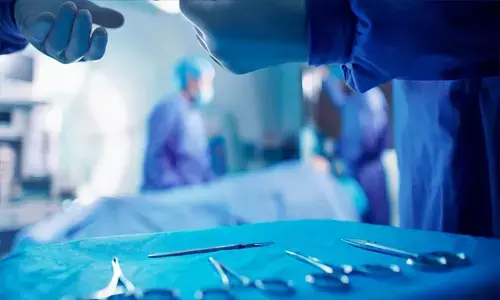- Home
- Medical news & Guidelines
- Anesthesiology
- Cardiology and CTVS
- Critical Care
- Dentistry
- Dermatology
- Diabetes and Endocrinology
- ENT
- Gastroenterology
- Medicine
- Nephrology
- Neurology
- Obstretics-Gynaecology
- Oncology
- Ophthalmology
- Orthopaedics
- Pediatrics-Neonatology
- Psychiatry
- Pulmonology
- Radiology
- Surgery
- Urology
- Laboratory Medicine
- Diet
- Nursing
- Paramedical
- Physiotherapy
- Health news
- Fact Check
- Bone Health Fact Check
- Brain Health Fact Check
- Cancer Related Fact Check
- Child Care Fact Check
- Dental and oral health fact check
- Diabetes and metabolic health fact check
- Diet and Nutrition Fact Check
- Eye and ENT Care Fact Check
- Fitness fact check
- Gut health fact check
- Heart health fact check
- Kidney health fact check
- Medical education fact check
- Men's health fact check
- Respiratory fact check
- Skin and hair care fact check
- Vaccine and Immunization fact check
- Women's health fact check
- AYUSH
- State News
- Andaman and Nicobar Islands
- Andhra Pradesh
- Arunachal Pradesh
- Assam
- Bihar
- Chandigarh
- Chattisgarh
- Dadra and Nagar Haveli
- Daman and Diu
- Delhi
- Goa
- Gujarat
- Haryana
- Himachal Pradesh
- Jammu & Kashmir
- Jharkhand
- Karnataka
- Kerala
- Ladakh
- Lakshadweep
- Madhya Pradesh
- Maharashtra
- Manipur
- Meghalaya
- Mizoram
- Nagaland
- Odisha
- Puducherry
- Punjab
- Rajasthan
- Sikkim
- Tamil Nadu
- Telangana
- Tripura
- Uttar Pradesh
- Uttrakhand
- West Bengal
- Medical Education
- Industry
Challenges in the management of retained lens fragments after Cataract surgery

According to a new study undertaken by Mirataollah Salabati and colleagues, retained lens fragments after the cataract surgery may result in a variety of vision-threatening problems.Therefore prompt identification and treatment can prevent permanent corneal endothelial damage and reduce the risk that patients will require corneal endothelial keratoplasty surgery.
The findings of this study were published in the Journal of Current Opinion in Ophthalmology.
Retained lens pieces are a very uncommon complication of cataract surgery. While there are no definitive standards for the surgical care or timing of this consequence, surgery is recommended for patients who have large lens fragments, chronic inflammation, secondary glaucoma, corneal edoema, retinal tears or detachments, and concomitant endophthalmitis. The purpose of this study is to provide an overview of the current surgical treatment of retained lens material.
Of all the data in the Intelligent Research in Sight registry database of 2.26 million patients who had cataract surgery in the United States revealed that 0.18 % (1 in 563) had secondary removal of retained lens fragments in the anterior chamber in the operating room within one year of the original cataract surgery. Men, smokers, patients with Medicaid or military insurance, and those who underwent difficult cataract surgery had a higher probability of returning to the operating room for retained lens material removal. For minor lens fragments, medical care with topical corticosteroids or observation may be attempted, but surgical removal remains the cornerstone of treatment for big lens pieces.
In conclusion, due to retained lens fragments after cataract surgery, it can cause a variety of vision-threatening problems. Understanding the risk factors, as well as the diagnostic and surgical management of retained lens fragments, is crucial to maintaining favorable visual results. Vitrectomy is beneficial in individuals who have posterior nuclear fragmentation, retinal detachment, endophthalmitis, or uncontrolled glaucoma that has not responded to medical treatment. A prospective research should be conducted to determine the ideal time for surgery for retained lens fragments which can give further idea to manage such problems in future.
Reference:
Salabati, M., Mahmoudzadeh, R., Wakabayashi, T., Hinkle, J. W., & Ho, A. C. (2021). Indications for surgical management of retained lens fragments. In Current Opinion in Ophthalmology (Vol. 33, Issue 1, pp. 15–20). Ovid Technologies (Wolters Kluwer Health). https://doi.org/10.1097/icu.0000000000000823
Medical Dialogues consists of a team of passionate medical/scientific writers, led by doctors and healthcare researchers. Our team efforts to bring you updated and timely news about the important happenings of the medical and healthcare sector. Our editorial team can be reached at editorial@medicaldialogues.in.
Dr Kamal Kant Kohli-MBBS, DTCD- a chest specialist with more than 30 years of practice and a flair for writing clinical articles, Dr Kamal Kant Kohli joined Medical Dialogues as a Chief Editor of Medical News. Besides writing articles, as an editor, he proofreads and verifies all the medical content published on Medical Dialogues including those coming from journals, studies,medical conferences,guidelines etc. Email: drkohli@medicaldialogues.in. Contact no. 011-43720751


